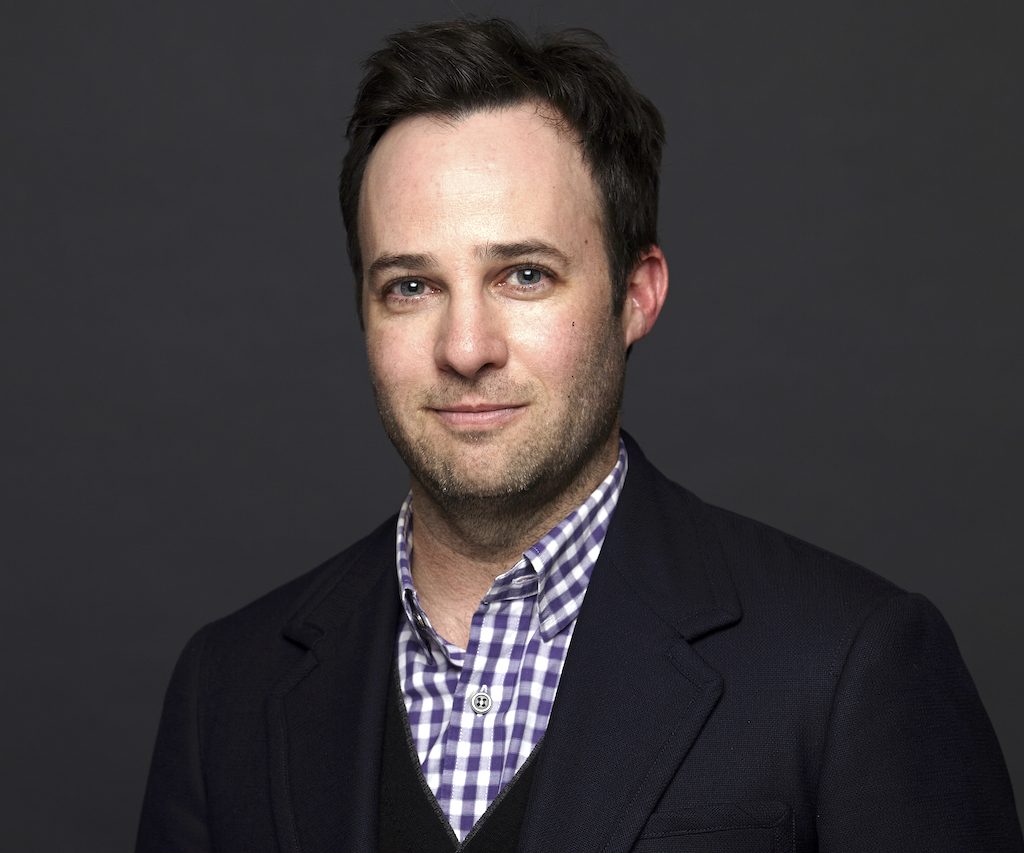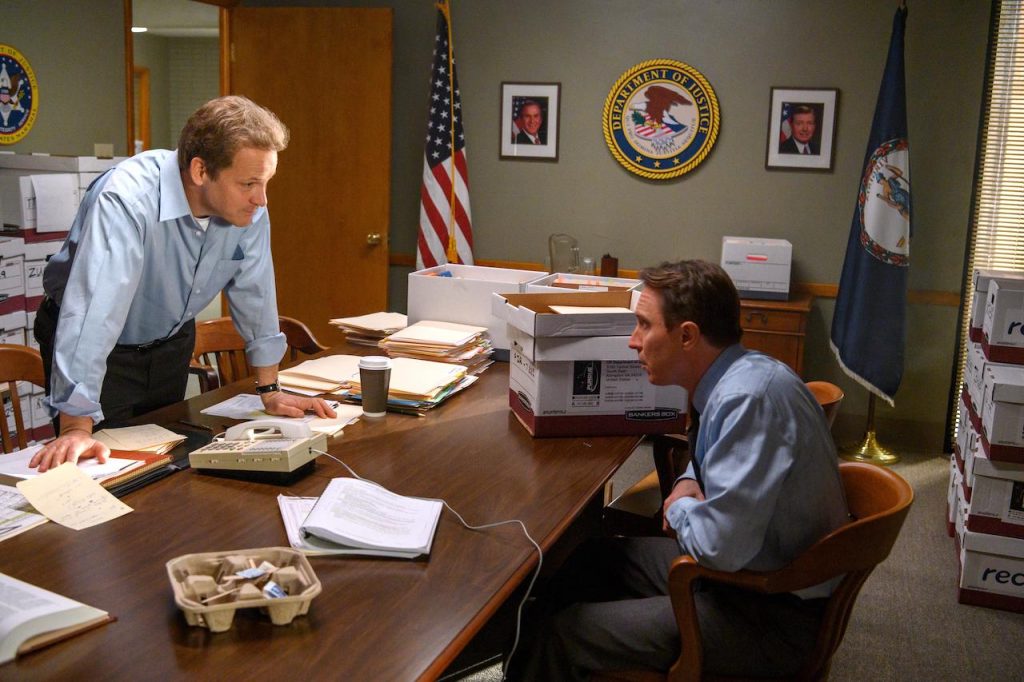The highly-addictive opiate drug OxyContin still sends shivers along the spines of countless communities who’ve been affected by its devastating consequences. A high-profile case against the drug’s manufacturer Perdue Pharma and the Sackler family started the wheels of the justice system rolling culminating in a huge settlement. The story was dramatized in a mini-series called Dopesick. Based on the novel Dopesick: Dealers, Doctors and the Drug Company that Addicted America by Beth Macy, creator Danny Strong (The Hunger Games: Mockingjay 1 & 2, The Butler, Empire) spoke with Creative Screenwriting Magazine about making his show.
His first concern was to focus on the dramatization of the events rather than sensationalizing them. “I tried to portray the events as accurately and truthfully as I could,” he said. “Dopesick had to be authentic and dictated by the facts of the case and the crimes had to be dramatized in a fair way.”
Any embellishment or sensationalization “would undermine the dramatic experience. Making it feel more like a documentary than entertainment would make the story more engaging and powerful.” Strong also endeavored to avoid any stereotypes of the Appalachian communities.

Danny Strong
Dopesick is a story about the ravages of addiction and its effects on both addicts, their families, and their communities. “It dives into the personalization of addiction, but also redefines the nature of addiction,” Strong continued. “Dopesick gives you an alternate way to look at how addiction is perceived in the United States.” Rather than dismissing addicts has being weak criminals, “the show illustrates how addiction is a disease where an individual’s brain is highjacked and an addict cannot function without this drug or they’ll be in severe pain.” This is the definition of dopesick.
Danny Strong wanted to highlight this fact rather than portray stereotypes of addicts being lazy, weak, and making poor life choices. In addition to these personal stories, Dopesick is also a David and Goliath story about the under-resourced DEA and Justice Departments trying to take them down.
Who Are The Sacklers?
Dopesick is an intense character study of a family consumed by their bottom line and those intent on stopping them. It’s important to understand where the Sacklers were coming from.
The Sackler family, who own Purdue Pharma, are driven by profit with no regard for human life. Dopesick further explores why they allowed Purdue to continue given the devastation and loss it caused. Richard Sackler (Michael Stuhlbarg) is of particular interest. “Greed is certainly a part of what the family wanted, but Richard’s personal motivations went beyond that. He wanted to succeed on his own and prove his worth to his family.” Richard desired, and often demanded respect from a family that didn’t seem to care much for him and often considered the black sheep. He also attempted to outdo his uncle Raymond Sackler (Lawrence Aracio) who built Purdue with his brother Mortimer (Walter Bobbie). “Richard is grappling with internal goals, demons, and issues throughout the entire series,” thereby making him a fascinating character.
The psychological impact of familial rejection is clearly evident in Richard Sackler. “He’s been described as being ‘on the spectrum’. He clearly suffers from some sort of personality disorder demonstrated by a complete lack of empathy. The darkest analysis is that he’s a sociopath.” Danny Strong concedes that we can only speculate on this based on Richard’s behavior on the public record. “You make deductions based on the information you get.”
The Sacklers are also divided by internal factions – the Raymond and the Mortimer loyalists. They were the brothers that started the company. This imparted opposing power dynamics to control the company. Raymond was supported by his two sons Jonathan (Ian Unterman) and Richard who work at Purdue. Mortimer had a larger faction since three of his children where on Purdue’s board of directors. This was a constant cause of internal strife as each wing battled for their preferred direction of the company.

Kathe Sackler (Jaime Ray Newman) and Richard Sackler (Michael Stuhlbarg) Photo by Gene Page/ Hulu)
Kathe Sackler (Jaime Ray Newman), Richard’s cousin, shared a special bond with him because they were both heavily involved in the business in a way the other siblings weren’t. The really understood each other.
In many regards, Dopesick not only sought to add a human dimension to the addicts, but also to the Sacklers. The can’t simply be drawn as one dimensional villains.
Purdue Marketing Masterclass
Purdue redefined the role of pharmaceuticals in medicine. They boldly encouraged patients “to redefine their relationship with pain.” Not only physical pain, but emotional pain too. OxyContin was the start of the direct marketing of drugs to consumers who specifically requested them rather than doctors prescribing them as required.
Purdue’s sales reps were seduced by their bonuses which were based on dosage rather than the number of pills sold. They sang from the hymn book that it was “non-addictive” despite mounting evidence to the contrary. Lethal overdoses skyrocketed across the country. Some wrestled with their moral conscience, but the lure of big checks was too powerful for most.

Rick Mountcastle (Peter Sarsgaard) and Randy Ramseye (John Hoogenakker) Photo by Gene Page/ Hulu)
The “Toppers Competition” further incentivized the sales staff to continue with the dangerous and immoral practice of pushing a highly-addictive narcotic. Purdue also peddled fun merchandise like caps, CDs, and stuffed animals to mislead consumers into thinking they were more benign. “This is a fun drug that will make you feel better. Your life will improve despite it being coined as ‘heroin in a pill.’”
Purdue used any opportunity to encourage patients to boost their dose. Despite these egregiously lying campaigns, Purdue was only charged with misbranding their product.
TV Show vs The Book
Danny Strong created and sold Dopesick before he was aware of the existence of Beth Macy’s book. “Another division of the studio bought the rights to the book unaware of Danny’s work.” Strong and Macy were urged to join forces. Fortunately, they were both on the same page, although Danny was already in the advanced stages of development. There was no need to reinvent the wheel and restart the process.
Macy joined the writers’ room and co-wrote the series, it wasn’t an adaptation per se. Macy elevated the factual aspects of the show with her expertise. Macy hails from Virginia, so she brought lived life experience to the TV show. Beth also invited Appalachian novelist Robert Geist to consult on the show, particularly on the tone of the scripts.
Although the main narrative was generated by Danny Strong, Beth Macy wanted Dopesick to further explore the treatments for opioid addiction. “Beth felt these treatments are highly stigmatized yet highly effective. She believed the show could move the needle in getting them more accepted and understood.” Strong embraced this idea, especially in the last two episodes of Dopesick.
The investigations into Purdue filtered into the Justice Department. Many details were vague or undisclosed. Strong was fortunate enough to gain access to staff that were there at the time to assist his research. “That was the toughest nut to crack and most in-depth piece of reporting to get the answers I needed.” These aspects were murky in the book.
Purdue Pharma has since shuttered and filed for bankruptcy (a ruling later overturned) and ordered to pay a $4.5 billion settlement, but criminal charges have yet to be filed.
Although Danny Strong created an arresting drama, he wants the audience to appreciate the extent of Purdue’s crimes. “They had a devious, methodical, and diabolical approach to deliberately selling a highly-addictive narcotic. The extent of the lies and deception is truly shocking.” Furthermore, the institutions that are meant to protect communities, have not only failed them, but aided and abetted the Sacklers. A number of former government officials meant to investigate and regulate them were offered lucrative roles at Purdue upon expiration of their terms. Strong hopes audiences understand the gravity of this on a visceral level as well as work towards a solution to the problem.
